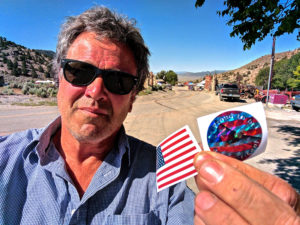 Since we’re all adults here, let’s have a common sense discussion. The topic? “Why do people lie?”
Since we’re all adults here, let’s have a common sense discussion. The topic? “Why do people lie?”
Books have been written on the subject, a topic with which every human has direct experience. But without going into deeper-than-necessary psychology, let’s agree that people generally lie to make things easier if not better for themselves. To protect themselves. We lie to avoid conflict, shame and punishment. Not getting spanked as a child or jailed as an adult is a better option than a whupping from dad or bunking in a 10 x 10 cell with Dirty Louie. People lie to get what they want. Money, sex, status. We’ve seen it thousands of times. It’s been a staple of popular fiction since the first storytellers gathered around a cave fire.
But who lies knowing things will only get worse for themselves?
Even people who lie as a strategic tactic — in society, business or politics — usually do it in a way that protects them from exposure and possible consequences. Self-preservation is as basic an animal instinct as breathing. You avoid situations that might lead to injury or death.
Which obviously brings us to Brett Kavanaugh v. Christine Ford. One of them is lying.
If Kavanaugh is lying it it’s easy to understand why. Everything about his reputation and status and ambition for authority/power is on the line. So, accused of sexual assault as a drunken teenager, he categorically denies it (lies) … as an adult. His life will be immeasurably better if the lie holds up. He will get what he wants. He will ascend to a level of influence held by only a handful of other humans and remain there until he dies.
That’s not hard to understand.
But Christine Ford? How does lying — as she’s being accused by the worst of Kavanaugh’s defenders — make her life better? More to the point, how would she ever see it it being better by making the accusation in the first place? An accusation, by the way, we know she made weeks before Kavanaugh was revealed as Trump’s choice for the Court?
If she was too naive to know, with near absolute certainty, how her accusation would affect her, the first lawyer she contacted and, guessing here, the first staffer in Diane Feinstein’s office would have walked her through the grueling horror of the absolutely inevitable out-of-control hyper-partisan reaction. She would be vilified and threatened. Her professional career would be imperiled, if not terminated. She would need expensive legal advice and protection for a long time to come. She might not even being able to return to her own home. (She is now in hiding.)
So why would she lie — or even say anything at all, even if “mistaken”, as Orrin Hatch says — if she understood any of that? Nothing about her life was going to get better. Everything was going to get worse, certainly in the short-to-intermediate term. (If her accusation derails Kavanaugh she’ll earn “atta girl” points in liberal history books.)
Common sense, the experience of any rational adult, tells us that Ford only wades into that level of horror, that level of epic, negative disruption of her life, if she is telling the truth. Or at least believes she’s telling the truth.
And as for Kavanaugh’s categorical denial: as many of have noted, you can’t walk back something that emphatic. Once you say, “This never happened.” You can’t then undo a lie by conceding that you were, A: a stupid kid, B: blind drunk, and then C: issue a (very) belated apology.
If Kavanaugh has lied about this attack, he hasn’t destroyed his reputation as a drunken teenager, he’s destroyed it as a sober adult.
If Ford has lied, she could be clinically diagnosed as “recklessly unstable”, which of course is already happening … by no one with a clinical degree.
